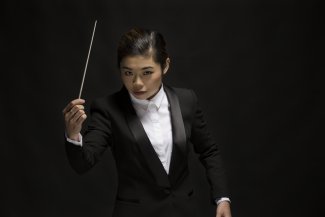




Level playing field
6/3/2020
Lydia Connolly explains that female conductors may need support to succeed, but ultimately it all comes down to talent
Since the late 1990s, when we took on Susanna Mälkki, we have been proud of the rising number of women on our conductor list. In January 2018 I was invited by James Murphy (now Chief Executive of the Royal Philharmonic Society) to speak at the Association of British Orchestras annual conference as part of his seminar on female conductors, and I had my eyes opened to the shockingly low percentage of women who were making it on the podium. Even if HP looked comparatively good, the numbers were persistently tiny. After that conference we began a conversation in the office about what we could do to ‘shift the dial’ – a conversation which led logically to incorporate a broader range of initiatives concerning inclusivity and accessibility in our company and in the industry.
Among all the obvious rights and benefits of that conversation and action, it has been particularly heartening to see how many younger members of HP staff have become involved – passionately and actively. This has brought an important sense of ownership of company strategy to colleagues throughout the company.

Signing female conductors, when they demonstrate the talent, character and potential to make a great career, is part of what we do. We don’t think of it now as a special initiative or programme. But I continue to maintain that as long as women in leadership are treated differently from how men are treated – and unfortunately that’s still a fundamental truth – they need different kinds of help to succeed. That is the difference between equality and equity – you have to give people the specific kind of support they need, otherwise they’re just not on the same playing field. Affirmative action has its place, in my view.
I believe that unconscious bias is still the single biggest obstacle to audiences and orchestras being truly gender blind when someone steps on the podium. In my experience, lazy stereotyping and inherent prejudice mean that ‘Think manager, think male’ still holds true far too often. And let’s face it: it’s difficult to think of a more visible, physical and ‘in your face’ manifestation of power than someone standing on a box waving their arms around telling people what to do.

At the same time – and this is a really sensitive issue – no female conductor worth her salt wants to be known as a ‘female conductor’. She wants to be known as a great conductor, pure and simple. I absolutely support this. However, while we still cannot count on equal treatment for female conductors, I believe we have to make special efforts to support women who’ve chosen to pick up the baton – so that before too much longer it really won’t be a talking point that the person occupying the podium is male or female.
There was a time when colleagues might have said that a woman conductor would have to be absolutely amazing for us to take a risk on her, but that has changed and rightly so. We will take on a woman or a man according to their talent, their potential and our belief as to whether they have what it takes to make it. We may from time to time get it wrong, but we will do that regardless of the artist’s gender.

Elim Chan is positive about the future, but looks forward to when being female is no longer an issue:
‘I love that HarrisonParrott is giving chances to women conductors who have the potential to grow. We’re still at the point where we have to consciously push forward, and I look forward to the day when things are normalised, and we no longer need to point out the female conductors. Sometimes I feel like I’m a special species in a zoo and there are lots of banners out saying, ‘Come and see this!’ In the end I just want to be with the other animals.
With the empowerment movement women have to do 150 per cent – not only the job, but be beautiful and a great citizen. You have to know yourself really well, and when to say, ‘No, this is not possible.’ I can’t be 150 per cent in everything. I can be 150 per cent in my art, but sometimes I want to be able to be myself and to forgive myself for being just okay.’



